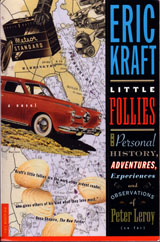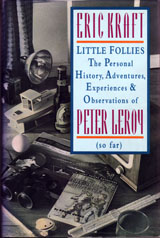

| Little Follies
The Static of the Spheres Chapter 9: The Occupations of an Early Riser |
by Eric
Kraft, as Peter
Leroy
|

YOU CAN READ THE FIRST HALF
YOU CAN ORDER THE
|
Gumma and Guppa loved to sleep late on weekends. When I was at home and wanted to talk to them on the telephone, I would have to wait until noon before I could call them. When I was spending a weekend with them, I knew that I had to be quiet until they were up, but there was always something interesting to look forward to on those weekends, something that made me impatient and restless, something that made me get up early. Gumma and I might be going to plant bulbs or bake bread or fry doughnuts. Guppa and I might be going to build a submarine out of oil drums or buy a Geiger counter and see if we could find any uranium deposits in the back yard or spread a new batch of clamshells on the driveway or just drive around town in the Studebaker looking to see if anybody had thrown away anything interesting. I would always be in a hurry to get going on these projects, so I would wake early. I would get up on my own and wander around the house for hours until Gumma and Guppa woke up. I filled these morning hours by playing with their cat, by drawing pictures at Guppa’s desk, and—when I was old enough—by making toast. This morning, I had already played with the cat. I had even fed him, given him fresh water, and let him in and out of the house several times. I had drawn several pictures, each of which was a landscape that featured a pond (because I had just learned to draw ponds with pretty convincing perspective and particularly enjoyed complicating their shorelines with points and lagoons), clouds (because I had also just learned to draw nice, plump, billowy cumulus clouds), shadows (because I got a kick out of using the side of the pencil point to shade things), a disproportionately large duck (because Guppa had a nice little cast-metal Merganser paperweight that I wanted very much to learn to draw), and the transparent moon that sometimes graces the daytime sky (because I had begun to develop a fondness for it that still persists). I had made myself three slices of toast and eaten one with butter, one with butter and peanut butter, and one with butter and strawberry jam. I was lying on the living-room rug in the light that fell through the windows in the front door. There were four diamond-shaped windows, themselves arranged in a diamond. The door was black and massive, made of wood, with iron strap hinges that ran nearly its entire width. It was rounded at the top. January sunlight fell in shafts through the windows, and in the shafts of sunlight, dust was dancing. Why, I wondered, does the dust dance that way? After some experimentation, I thought that I had found the answer. The dust was alive. (I did not believe this, of course; I was merely passing the time until Gumma and Guppa got up.) From the conclusion that the dust dancing in the air was alive, it was not a great leap to the idea that the dust on the floor must be dead. There wasn’t a lot of dust on the floor; just enough. I picked up a little on my finger and blew it into the sunlight. It leaped and danced with more vigor than the dust I had been watching. I had been wrong! The dust on the floor was just resting, sleeping late, like Gumma and Guppa. (My morning wasn’t being wasted: I was exercising the faculty of human reasoning. I had accumulated some information and I had detected in it or pretended to detect in it certain patterns, and from them I had drawn a couple of conclusions. Then, as happens as often as not, along came some new information, and I was forced to recognize that the conclusion was wrong or not quite right. I took the old information and the new information, shook them well together, and poured out a new conclusion. I had to do quite a lot of this while I was growing up, and I found, frequently, that my conclusions made adults (and even older children) laugh, so when a private opportunity to practice arose—as this one had—I seized it. However, the affection that I had developed for any of my old conclusions was likely to persist strongly enough to leave its mark on a new one, and over the course of time I’ve found that I grow fonder and fonder of certain of the old conclusions and wearier and wearier of accommodating new information.) I had decided that the dust on the floor wasn’t dead; it was just resting. Perhaps I was on to something. I’d have to gather more information. I went down to the cellar, where there was plenty of dust. I ran a series of tests. A lot of the dust down there turned out to be just resting too, even the sawdust. I sat down and thought. The idea came to me that everything, everything I saw and touched, even the air I moved through, was moving, was in a sense alive. “Peter, are you down there?” It was Gumma, calling me from the top of the cellar stairs. “Yes, Gumma,” I called. “I was just—” I hesitated. Was I going to say that I was just looking at dust? I had enough experience with adults to know that that probably wouldn’t be well received. “— waiting for Guppa,” I said. “You have to be patient, Peter,” said Gumma. “You have to remember that Guppa works very hard all week long, and he needs his rest on the weekends. It’s the only time he has to sleep late.” I’d gotten myself into a mess. “Oh, I know that,” I said. “That’s why I was being so quiet, and I was sweeping up dust in the cellar to help him out.” “You’re a good boy, Peter,” said Gumma, in a voice as warm as a hug. “Come on up and help me make breakfast.” She knew that this was a reward, since I liked helping her with any kitchen work, though I especially enjoyed using the toaster. The smell of coffee and bacon drew Guppa out of bed soon enough, and he arrived in the kitchen as bright-eyed and eager to begin work as I had been when I awoke, hours before. “Well, Peter,” he said. “Up ’n’ at ’em ’n’ eager to go, are you?” Some of my enthusiasm had worn off while I waited. I had made the mistake of imagining what work we would do, imagining my excitement, imagining the parts in my hands, Guppa’s voice reading slowly through the instructions, and I had become a bit bored by the day’s work. I was, after all, going to have to go through it for a second time. “Yessiree!” I said, but my eagerness was forced, and it gave to the whole undertaking, before it had even really begun, the insidious suggestion of error, of something wrong enough at the start that it can’t be put right by the end. If this feeling were an odor, it would smell like wet wool. |

|
||

Here are a couple of swell ideas from Eric Kraft's vivacious publicist, Candi Lee Manning: Tip the author.
Add yourself to our e-mailing list.
|
Little Follies is a work of fiction. The characters, incidents, dialogues, settings, and businesses portrayed in it are products of the author’s imagination and are not to be construed as real. Any resemblance to actual events or persons, living or dead, is entirely coincidental. All rights reserved. No part of this book may be reproduced or transmitted in any form or by any means, electronic or mechanical, including photocopying, recording, or by any information storage and retrieval system, without permission in writing from the author. “My Mother Takes a Tumble,” “Do Clams Bite?,” “Life on the Bolotomy,” “The Static of the Spheres,” “The Fox and the Clam,” “The Girl with the White Fur Muff,” “Take the Long Way Home,” and “Call Me Larry” were originally published in paperback by Apple-Wood Books. Little Follies was first published in hardcover by Crown Publishers, Inc., 201 East 50th Street, New York, New York 10022. Member of the Crown Publishing Group. YOU CAN ORDER THE
For information about publication rights outside the U. S. A., audio rights, serial rights, screen rights, and so on, e-mail the author’s imaginary agent, Alec “Nick” Rafter. The illustration at the top of the page is an adaptation of an illustration by Stewart Rouse that first appeared on the cover of the August 1931 issue of Modern Mechanics and Inventions. The boy at the controls of the aerocycle doesn’t particularly resemble Peter Leroy—except, perhaps, for the smile. |
|
||||||
| . | . |